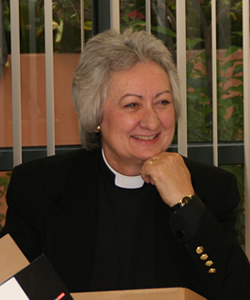A Discussion with Gwynne Guibord, Priest, Founder, and President of The Guibord Center
With: Gwynne Guibord Berkley Center Profile
February 9, 2015
Background: Rev. Guibord founded and directs the Guibord Center in Los Angeles. It draws on the inspiration of her 20 years of working with leaders of the many faith practices and traditions that live side by side in Southern California. The aim is “to bring people together to challenge assumptions, unleash the Holy, and affirm the faith that transforms the world.” Interreligious dialogue is thus a central challenge as the Center addresses the issues facing the community and the nation. Domestic violence has emerged as a live topic, and the Center has organized several events to address the issue. This exchange with Katherine Marshall took place in Atlanta on February 9, 2015, on the margins of the Carter Center Human Rights Defenders Forum. The discussion served as an introduction to the short and powerful video on violence against women that was screened as part of the Forum. Rev. Guibord stresses the vital importance of healing in the effort to combat domestic violence and of engaging men in a positive and truly spiritual way.
The PSA that was screened is an inspiring and wonderfully positive approach to a horrible problem. How did it come to be?
The first inspiration came from Dr. Amy-Jill Levine, who is a Second Testament scholar at Vanderbilt University. It was she who helped to shape the idea of a liturgical event focused on violence against women. But as we began to conceive the event itself, we thought it would be good to have a Public Service Announcement (PSA) on the website and to post on Facebook, something that everyone would be encouraged to share.
I was struck that whenever the topic of domestic violence came up, there was always a photo of a badly battered woman. What we wanted instead was the image of a healthy man, or men, across a wide spectrum of religious beliefs and traditions, arguing that violence against women is violence against Allah, God, the Buddha, and so forth.
It is important that people know that there are healthy men who understand the moral value of treating women as whole, healthy beings, men who do not bully. The issue needs to be portrayed in a positive way. These images can also have a healing effect on women who have been battered. It shows them that there are men who value women for who they are.
Thus the short PSA shows one man after another, from many racial backgrounds, with their sons, with the core message that true men do not beat women.
How did you come to focus on domestic violence?
The world’s great religious prophets and leaders never resort to violence, and none have treated women with disrespect. Religious traditions have drifted far from this fundamental fact. This core belief led me to want to take an approach to domestic violence that was positive and healing. Thus we worked on the liturgical event.
The Saving Grace event that we organized at the Center was huge. There were several hundred people there. We worked with ritual as a path to healing. Two women spoke of their personal experience of abuse and were initially covered with a black shawl. These were removed and replaced with a white shawl that had the inscription: ‘I am a beloved child of the Holy…always.” Each person attending wrote down something that they wanted to remove as a thought or memory. All present was draped in a white shawl while being given a Blessing. The papers were burned as part of the liturgical ceremony. People said that afterwards they felt quite differently, that something was lifted from them and from their minds.
But what amazed me most was the many people who came up to me afterwards, or sent me emails, speaking of how they had been beaten or raped as a child. I really had no idea that this was an epidemic on this scale. One woman described how, as a young girl of 17, she was abducted and raped. When she went to her church, she was told that it was her fault. So she was raped twice, first by the man and second by her church.
A second woman, an officer in the military, told me about how she was working in her church, a single Mom with children. The pastor made clear that for her to continue in her job she would need to “cooperate.” She did not dare at first to speak about this but when she did no one believed her. The congregation and church leaders shamed her. No one wanted to deal with the realities of what had happened.
I have been asked to organize another liturgical event because of its impact. We will see.

